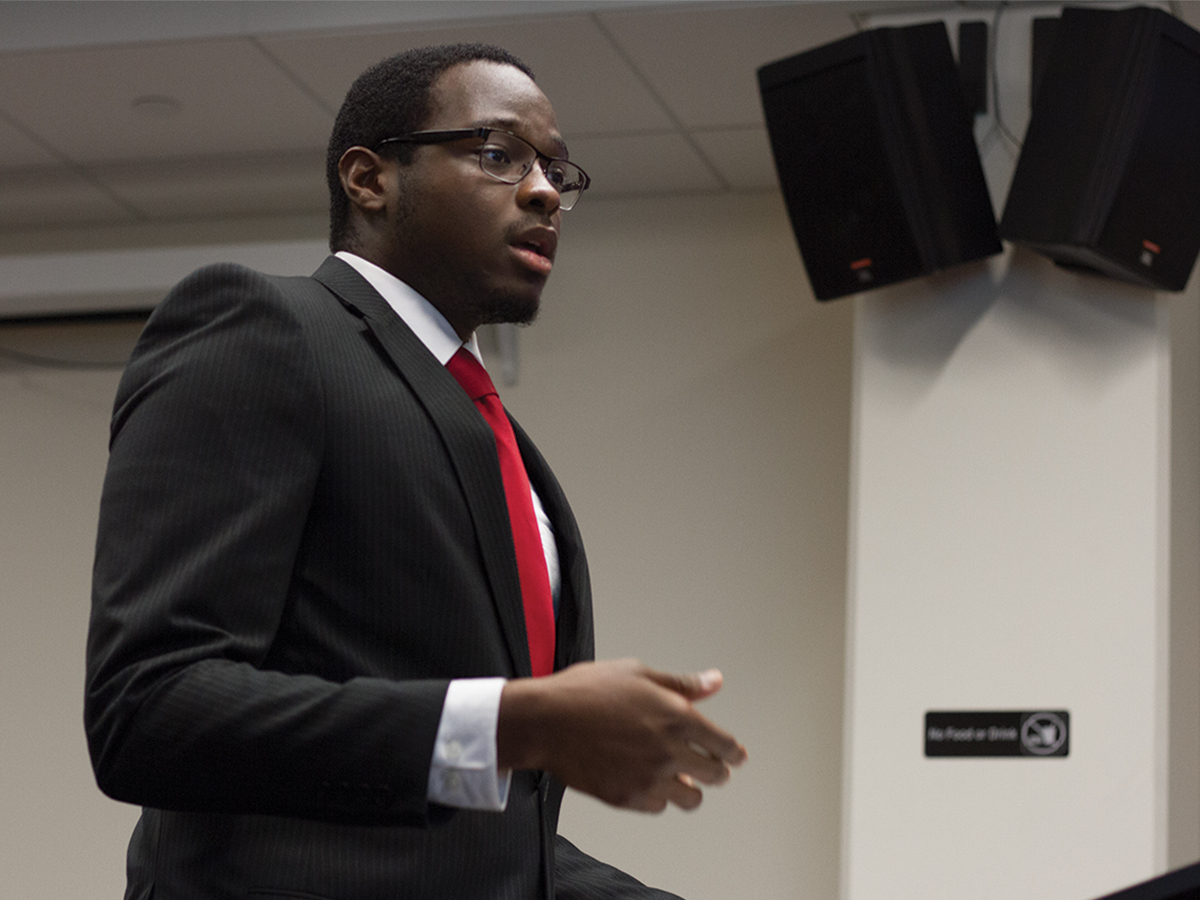Beginning at 6:30 p.m. on Wednesday, Feb. 21, ASUCR held their twelfth senate meeting of the academic year in the senate chambers, HUB 221.
ASUCR President Aram Ayra presented his nomination for chief justice of the ASUCR Judicial Council, Jo Gbujama, a fourth-year philosophy law and society and ethnic studies double major.
Gbujama, who served as chief justice last year, was nominated by Ayra because of the resignation of Casey Thielhart, who stepped down in order to run for vice president of campus internal affairs in the 2018 elections.
Ayra explained his process behind selecting the new chief justice; he originally sought Vice Chief Justice Matthew Whiles, a fourth-year history major, but Whiles declined the position due to other commitments on campus. Ayra briefly considered nominating 2016-17 Vice Chief Justice Hayden Jackson, a third-year political science major, but Ayra and Jackson decided against it due to a potential conflict of interest stemming from Jackson’s position as Ayra’s current chief of staff.
“Jo (Gbujama) is ready and willing,” said Ayra during the meeting, “He’s had previous experience on judicial council so he’s been through the wringer a few times and seen us at our lowest points and (has) gotten us through that.”
Gbujama was approved unanimously, 13-0-0, in a closed ballot vote.
In an interview later in the week, Gbujama expressed his excitement to be returning as chief justice. “A lot of my most cherished memories come from being a part of the student government. I’m more that (sic) ready to come back and serve my community as a member of the ASUCR Judicial Council,” wrote Gbujama in an email.
Gbujama shared that he felt both his experience in ASUCR as well as his numerous extracurricular activities on campus afford him a unique skill set when approaching the position, which requires conducting judicial meetings and presiding over the impeachment hearings of executive officers. During his tenure as chief justice in 2016-17, Gbujama utilized the Judicial Fellowship Program to recruit curious students and teach them about the Judicial Council. Additionally, he started the Judicial Transparency Program which made available all judicial rulings and decisions on the council website. He intends to restart uploading judicial records to the website during his time as chief justice.
Gbujama, who serves as president of the Phi Alpha Delta Law Fraternity, International and vice president of UCR’s Black Law Student Association, explained that the interactions he has had with legal professionals “has benefited my understanding of the legal system and my capacity to be an effective justice.” He also believes that his experience teaching a R’Course in spring and fall 2017 entitled “Introduction to Africana Philosophy” will help him effectively mentor the new justices that sit on the council.
Gbujama, who plans on attending law school after his graduation this spring, will fill the remainder of Thielhart’s term, lasting through the rest of winter quarter and all of spring quarter 2018.
Highlights:
- Elections Director Taylor Brown revealed that after candidacy filing closed on Tuesday, Feb. 20, 66 total candidates were applied to run in the 2018 ASUCR elections. A total of 20 people are running for various seats in the executive cabinet (ECAB). The senate filings are as follows: 33 CHASS candidates, seven CNAS candidates and six BCOE candidates.
- In a statement at the beginning of the meeting, Ayra announced that HEAT was cancelled because the HUB Governing Board, after a 2001 referendum that lowered the student fee from $110 to $90, has $1.5 million “less to work with.” Ayra also explained that the HUB may let more of the concert culture fall to the authority of the Associated Students Program Board, since, per Ayra, they have done “such a phenomenal job.”
- Ayra also revealed that a nameless wealthy alumnus and former ASUCR president from 1972 is donating a sculpture embodying the UC’s motto, “fiat lux,” or “let there be light.” According to Ayra, the statue will resemble a “giant silver flame coming out of black granite.”
- CHASS Senator Grant Nakaoka divulged during senate reports that he is working on a resolution to recognize that the land UCR is built on once belonged to the Cahuilla people, a Southern California Native American tribe. Nakaoka also told the senate that this has expanded to possibly getting an indigenous studies requirement passed through the Academic Senate. Nakaoka also plans on visiting the Cahuilla reservation near Anza, California in the near future.
- CHASS Senator Marco Ornelas notified the senate that he will be proposing a cut to ECAB members’ stipends. Ornelas explained in an email that “Some members of the executive cabinet get paid upwards of 10 grand … no one working for an elected position in a college student government should be making that much money.” Ornelas explained that this type of income attracts the “wrong people to the job” and would be an additional step to reform ASUCR and increase transparency. Ornelas said that he would use this money to build storage containers for campus organizations and donate more money to the R’Pantry. He is unsure if this will apply to senators but finds it fair to reduce ECAB stipends to around $1,000 a year and directors and senators’ stipends to $500 a year.








